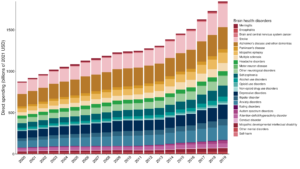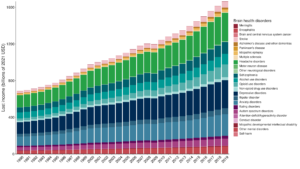The Brain Advantage for a Thriving Economy: A Global Call to Action

Disclaimer: The French version of this text has been auto-translated and has not been approved by the author.
(Full author list provided below)
The Brain Advantage for a Thriving Economy: A Global Call to Action
All G7 nations are concerned about productivity. We believe the future of productivity and economic growth depends on optimizing brain capital—encompassing brain health, cognitive skills, and emotional resilience. As demographics shift and workforce demands evolve, we must act now to integrate brain capital into finance, labour, research and innovation policies to ensure long-term vitality.
The G7 has an unprecedented opportunity—and responsibility—to put brain health and brain skills at the heart of global economic policy. Our recent policy concept note details why recognizing brain capital as a core asset isn’t just a matter of public health—it’s an economic imperative.
The Challenge: A Global Brain Economy at Risk
Economic resilience depends on brain capital—the combined power of brain health and brain skills that fuel productivity, innovation, and adaptability. Yet, despite its growing importance, brain capital remains absent from global economic strategies, leaving trillions in potential growth untapped.
Brain capital consists of:
- Brain health – the foundation for cognitive function, emotional well-being, and neurological resilience.
- Brain skills – cognitive, social, and emotional abilities such as problem-solving, adaptability, and critical thinking.
The case for prioritizing brain capital in economic policy is clear:
- At Davos 2025, brain health was recognized as a priority for policymakers and business leaders.
- The 2025 World Economic Forum Future of Jobs Report found that half of the top emerging job skills are brain-related (e.g. creativity, analytical thinking).
- Research from McKinsey Health Institute suggests that investing in brain health could boost global GDP by up to 12%.
As economies confront workforce shortages, demographic shifts, and technological disruption, brain capital will define which nations thrive and which fall behind. The G7 has a critical opportunity to lead by embedding brain capital into core economic and workforce policies—ensuring sustained growth, resilience, and long-term prosperity.
The Cost of Inaction
Productivity Decline and Economic Stagnation
For over a decade, productivity stagnation has constrained economic growth across G7 nations, a challenge long recognized by the IMF and OECD. Canada, Japan, the UK, and Italy have seen productivity slowdowns since 2010, deepened by the financial crisis and COVID-19. The result: weakened competitiveness, rising fiscal pressures, and a workforce struggling to adapt.
Brain health remains largely overlooked as a key driver of economic productivity. While economists cite technological diffusion, structural rigidities, and demographic shifts, the impact of brain disorders – from developmental and mental health conditions to neurodegenerative disease – extends economic burden across the lifespan, straining both labour markets and fiscal sustainability. Brain health is also critical for entrepreneurial growth, as resilient founders drive innovation, create jobs, and help economies recover from disruption.
Conventional economic fixes have failed. Structural reforms and stimulus measures overlook the human capital crisis at its core. A new approach is needed—one that integrates brain capital into economic policy as a fundamental driver of long-term productivity and growth.
Impacts of Brain Health
Brain health challenges are pervasive, affecting individuals, economies, and societies at large:
- 1 in 5 Canadians (8 million people) live with a brain condition, including neurological disorders, brain injuries, mental illnesses, and addictions (Canadian Brain Research Strategy).
- 1 in 3 people across the West will develop a brain disorder in their lifetime, directly or indirectly impacting every segment of society (Ontario Brain Institute).
- Global economic losses due to brain disorders range from $2.5 to $8.5 trillion annually in lost productivity alone, with trillions more in
- Direct costs: Medical expenses, hospitalizations, long-term treatment.
- Indirect costs: Lost income for affected individuals and caregivers, reduced tax revenue, workforce dropout, and escalating long-term care expenses.
These challenges are exacerbated by the pressures of modern life—rapid technological change, environmental stressors, and social isolation—all of which strain our collective cognitive resilience. In this context, brain health is a linchpin for national security, economic stability, and social well-being. Addressing these challenges require not only policy reforms but also sustained investments in research that advance our understanding of brain health and its direct impact on workforce productivity.
Figure 1: Costs of Brain Health Disorders, 2019, global direct spending (top) and global lost income (bottom).


Preliminary estimates courtesy of the Institute for Health Metrics and Evaluation (IHME)


Figure 2: Population age structure in Canada, 2000 (top) and 2100 forecast (bottom).
Why the G7 Must Act Now
Brain capital is increasingly recognized as an economic priority, but global efforts remain fragmented. Key initiatives have begun integrating brain health into policy and investment strategies, but coordinated leadership is still lacking.
There has been promising progress on the global stage. The 2013 G8 Dementia Summit, the 2018 G20 Initiative for Early Childhood Development, and various recent events at 2025 World Economic Forum at Davos and other international platforms have spotlighted the importance of brain health. These initiatives have laid the groundwork for a more integrated, global approach to brain capital.
Furthermore, pioneering efforts like the United Nations Brain Days and the Brain Capital United Kingdom Summit have demonstrated that when diverse stakeholders come together, innovative solutions emerge. These examples provide both inspiration and practical models for what can be achieved under Canada’s G7 Presidency.
A G7 Blueprint for the Brain Economy
Recognizing brain capital as an economic imperative is the first step. To harness this potential, the upcoming G7 meeting—under Canada’s leadership—must prioritize investments in brain health and skills. This will require coordinated efforts across research, innovation, and policy.
To adapt to the evolving global landscape, the G7 must recognize brain capital as a core economic asset and take steps to optimize it, including:
- Establishing a G7-plus Brain Economy working group under the G7 Finance-Health Ministerial Working group to develop a strategic plan and funding approach.
- Hosting an exploratory first-ever G7 Brain Economy Conference in 2025, culminating in a G7 Declaration on the brain economy.
- Aligning the brain economy with the B7’s business agenda by encouraging corporate investments in brain health, workforce productivity, and cognitive resilience.
By taking leadership on the brain economy, the G7 can drive sustainable economic growth by improving workforce productivity, align business and policy agendas by integrating brain capital investment into G7/B7 strategies, and avoid trillions in lost economic potential by proactively addressing cognitive health and workforce retention.
Co-Authors:
Harris A. Eyre, MBBS, PhD, Harry Z. Yan and Wieman Gao Senior Fellow, Baker Institute for Public Policy, Rice University, Houston, Texas; Visiting Senior Fellow, Wharton Neuroscience Initiative, The Wharton School, University of Pennsylvania, Philadelphia, Pennsylvania
Jennie Z. Young, PhD, Executive Director, Canadian Brain Research Strategy, Montreal, Canada
Julian Karaguesian, Visiting Lecturer, Department of Economics, McGill University, Montreal, Canada; Co-Founder, Age of Economics; Former Special Advisor, Ministry of Finance, Canadian Government
Mikele Epperly, PhD, Global Integrated Program Leader, Brain Health & Medical Affairs Basel Site Head, Global Product Development Medical Affairs, Roche, Basel, Switzerland
Jeane Day, Executive Director, Alzheimer’s Society of Montreal, Canada
Claudio Lino Alberto Bassetti, MD, Vice-President, European Brain Council, Past-President, European Academy of Neurology, Chair, Swiss Brain Health Plan, Basel, Switzerland
Tom Mikkelsen, MD FRCPC, DABPN, President and Scientific Director, Ontario Brain Institute, Toronto, Canada
Rym Ayadi, Founder and President, Euro-Mediterranean Economists Association, Barcelona, Spain; Senior Advisor, Center for European Policy Studies, Brussels, Belgium; Adjunct Professor of Finance and Banking, CASS Business School at City College London
William Hynes DPhil, Honorary Professor for Rebuilding Macroeconomics at the Institute for Global Prosperity at UCL, London, United Kingdom; External Applied Complexity Fellow at the Santa Fe Institute, Santa Fe, New Mexico
Frederic Destrebecq, Executive Director, European Brain Council, Brussels, Belgium
George Vradenburg, Chairman, UsAgainstAlzheimer’s and Davos Alzheimer’s Collaborative, Washington DC and Geneva, Switzerland
Michael Platt PhD, James S. Riepe Penn Integrates Knowledge Professor in Neuroscience, Perelman School of Medicine, Psychology in the School of Arts and Sciences, and Marketing in the Wharton School; Executive Director, Wharton Neuroscience Initiative, University of Pennsylvania, Philadelphia, Pennsylvania
Steve Carnevale, Founder and Chairman of UCSF Dyslexia Center, San Francisco, California; Commissioner, California Mental Health Services Oversight and Accountability Commission, Sacramento, California
Alfred NJAMNSHI, Founder and CEO, Brain Research Africa Initiative, Geneva, Switzerland
Quazi Haque, Professor of Mental Health, Co-Founder and CMO Elysium Healthcare, Ramsay HCG
Agustín Ibáñez, PhD, Professor, Global Brain Health, Global Brain Health Institute, Trinity College Dublin, Director, Latin American Brain Health Institute, Universidad Adolfo Ibáñez
Jan Schadrack, MD, PhD, Global TA Hea Neuroscience and Rare Diseases, Medical, Roche
John Kirton, PhD, Professor of Political Science, University of Toronto. Director of the G7 Research Group, G20 Research Group and the Global Health Diplomacy Program, co-director of the BRICS Research Group, Global Governance Program, University of Toronto
Guy Rouleau, OC, OQ, MD, PhD, FRFCP( C), FRSC, Director, Montreal Neurological institute and Hospital, Chair of the Department of Neurology and Neurosurgery of McGill University
Vladimir Hachinski, CM, MD, DSc, FRCPC, FCAHS, FAHA, FAAN, FRSC, Professor of Neurology and Epidemiology, Department of Clinical Neurological Sciences, Western University

